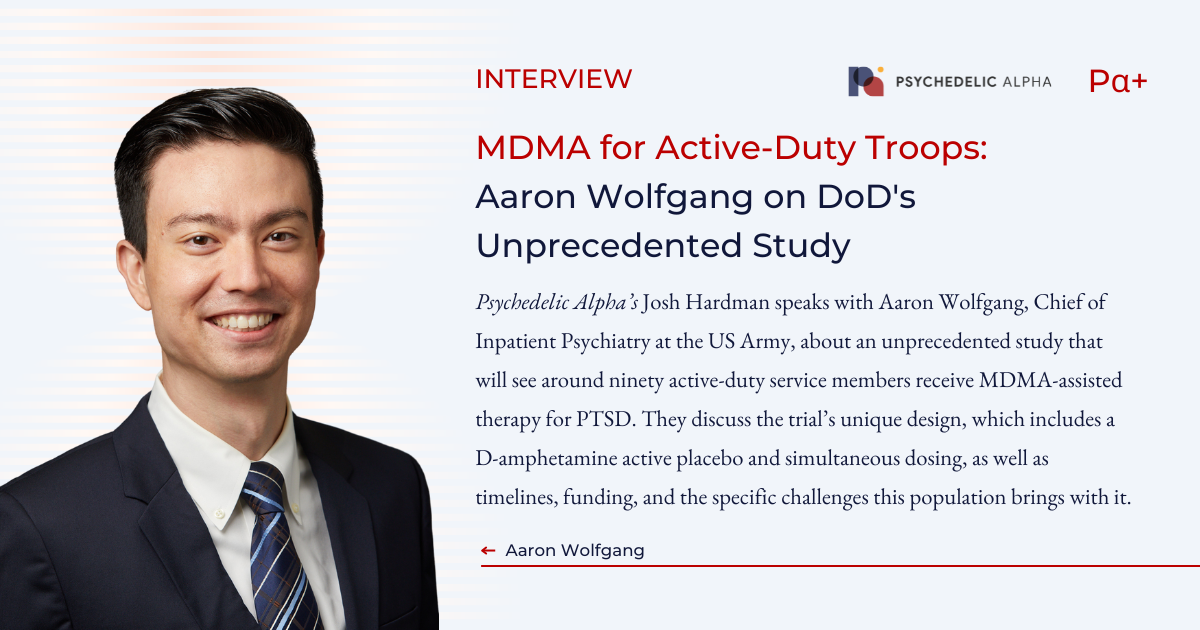The Department of Defense (DOD) is launching its first-ever clinical trial of MDMA-assisted therapy for active-duty service members with PTSD at Walter Reed National Military Medical Center.
In our latest Pα+ interview, Psychedelic Alpha Editor Josh Hardman speaks with Aaron Wolfgang, Chief of Inpatient Psychiatry at the US Army, for a first look at the study’s design.
The landmark trial, funded via the Defense Appropriations Act, has a number of interesting features. Those include the use of D-amphetamine as a control, a combination of the Lykos Therapeutics model as well as Acceptance and Commitment Therapy (ACT), and a Simultaneous Dosing Paradigm, to name just a few.
The first section of this interview is free to read, with the remainder below the paywall…
***
Josh Hardman, Psychedelic Alpha: Can you share further information about the study?
Aaron Wolfgang: The project is currently titled A Randomized, Double-Blind, Placebo-Controlled Clinical Trial of the Safety and Efficacy of MDMA-Assisted Therapy for Active Duty Service Members with PTSD.
3 dosing sessions: MDMA at 80mg, 120mg for 2nd dose, and 3rd dose with flexibility to go with 80 or 120mg depending on shared decision-making between participant and study team – similar to the Phase 3 studies.
Control will be D-amphetamine; it was a close call between D-amphetamine and low-dose MDMA since there’s decent evidence and rationale to support either, but the deciding factor was that one of our key secondary outcomes is looking at cardiac safety which we believe needs to be better characterized. And given D-amphetamine is already FDA-approved with a well-characterized cardiac profile, that was the deciding factor.
N = 5 open-label lead-in + 86 randomized = 91 total. Location: Walter Reed National Military Medical Center in Bethesda, MD. All Active Duty Service Members with moderate to severe PTSD.

We’ll also be studying the paradigm of Simultaneous Dosing which will involve 4-5 rooms being run simultaneously with each room having 1 participant and only 1 therapist instead of 2. A supervising physician will then be in a separate room overseeing audiovisual feeds to all rooms and providing support as needed. Aside from group dosing (which is yet unclear if this would be supported post-FDA-approval), we believe Simultaneous Dosing is likely to be a resource-efficient model that takes hold in the post-approval landscape. However, because no RCTs have yet studied this model, this model needs to be studied to better characterize if we can truly improve resource efficiency in this way without compromising safety.
While everyone will be trained in the base Lykos model, we’ll also be integrating Acceptance and Commitment Therapy (ACT) as a therapeutic framework. Given one of the main criticisms of the FDA advisory committee was the therapeutic modality of MDMA-AT, there seemed to be two distinct approaches we could take in selecting which framework to go with: do we first start with an EBP [(evidence-based psychotherapy)] that’s already efficacious for PTSD (like PE, CPT, EMDR, or CBCT) and augment that with MDMA? Or do we first start with what are believed to be the fundamental principles of good MDMA-AT/PAT and then find a way to best find and adapt an EBP to align with that?
Neither approach is wrong given the current state of the literature, but for a variety of reasons, we elected to go with the latter approach. That’s how we landed on ACT, which we believe provides a much-needed evidence-based framework that also nicely complements the fundamental principles of MDMA-AT.
To continue reading this interview, please sign in to your Pα+ account…
Join Pα+ Today
Independent data-driven reporting, analysis and commentary on the psychedelics space: from business and drug development through to policy reform and culture.
Already a member? Log In
✓ Regular Bulletins covering key topics and trends in the psychedelics space
✓ Regular articles and deep dives across psychedelic research, policy and business
✓ Interviews with insiders
✓ Monthly interactive database and commentary on psychedelic patents
✓ Quick-take analysis of major developments
✓ A Library of primers and explainers
✓ Access to our full back catalogue


